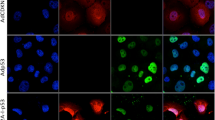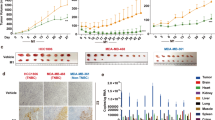Abstract
We evaluated anti-tumor activity and toxic effect of an adenoviral vector expressing the GFP/TRAIL fusion gene from the hTERT promoter (designated Ad/gTRAIL) on human breast cancer cell lines and on normal human breast cells. Treatment with Ad/gTRAIL elicited high levels of transgene expression and apoptosis in a variety of breast cancer cell lines. Furthermore, treatment with Ad/gTRAIL was effective in killing breast cancer lines resistant to doxorubicin or soluble TRAIL protein. In contrast, only minimal transgene expression and toxicity was detected in normal human primary mammary epithelial cells after treatment with this vector. An in vivo study further showed that the intralesional administration of Ad/gTRAIL effectively suppressed the growth of human tumor xenografts derived from both doxorubicin-sensitive and doxorubicin-resistant breast cancer lines. Specifically, about 50% of animals bearing doxorubicin-sensitive and doxorubicin-resistant breast cancer xenografts showed complete tumor regression and remained tumor-free for over 5 months. These results suggest that the adenovirus encoding the GFP/TRAIL gene driven by the hTERT promoter has potential application in cancer therapy.
This is a preview of subscription content, access via your institution
Access options
Subscribe to this journal
Receive 50 print issues and online access
$259.00 per year
only $5.18 per issue
Buy this article
- Purchase on Springer Link
- Instant access to full article PDF
Prices may be subject to local taxes which are calculated during checkout





Similar content being viewed by others
References
De Jong S, Timmer T, Heijenbrok FJ, de Vries EGE . 2001 Cancer and Metastasis Reviews 20: 51–56
Griffith TS, Anderson RD, Davidson BL, Williams RD, Ratliff TL . 2000 J. Immunol. 165: 2886–2894
Gu J, Kagawa S, Takakura M, Kyo S, Inoue M, Roth JA, Fang B . 2000 Cancer Res. 60: 5359–5364
Gu J, Zhang L, Huang X, Lin T, Yin M, Xu K, Ji L, Roth JA, Fang B . 2002 Oncogene 21: 4757–4764
Jazirehi AR, Ng CP, Gan XH, Schiller G, Bonavida B . 2001 Clin. Cancer Res. 7: 3874–3883
Kagawa S, He C, Gu J, Koch P, Rha SJ, Roth JA, Curely SA, Stephens LC, Fang B . 2001 Cancer Res. 61: 3330–3338
Keane MM, Ettenberg SA, Nau MM, Russell EK, Lipkowitz S . 1999 Cancer Res. 59: 734–741
Kim NW, Piatuszek MA, Prowse KR, Harley CB, West MD, Ho PL, Coviello GM, Wright WE, Weinrich SL, Shay JW . 1994 Science 266: 2011–2015
Klement G, Huang P, Mayer B, Green SK, Man S, Bohlen P, Hicklin D, Kerbel RS . 2002 Clin. Cancer Res. 8: 221–232
Koch PE, Guo ZS, Kagawa S, Gu J, Roth JA, Fang B . 2001 Mol. Ther. 3: 278–283
Lebwohl DE, Canetta R . 1999 Ann. Oncol. 10: 139–146
Levine MN, Bramwell VH, Pritchard KI, Norris BS, Shepherd LE, Abu-Zahra H, Findlay B, Warr D, Bowman D, Myles J, Arnold A, Vandenberg T, MacKenzie R, Robert J, Ottaway J, Burnell M, Williams CK, Tu D . 1998 J. Clin. Oncol. 16: 2651–2658
Nagane M, Huang HJS, Cavenee WK . 2001 Apoptosis 6: 191–197
Nguyen T, Zhang XD, Hersey P . 2001 Clin. Cancer Res. 7: 966s–973s
Parker SL, Tong T, Bolden S, Wingo PA . 1996 CA: A Cancer Journal for Clinicians 46: 5–27
Seth P, Kateyose D, Li Z, Kim M, Wersto R, Craig C, Shanmugam N, Ohri E, Mudahar B, Rakkar AN, Kodali P, Cowan K . 1997 Cancer Gene Ther. 4: 383–390
Shay JW, Bacchetti S . 1997 Eur. J. Cancer 33: 787–791
Stampfer MR, Yaswen P . 1994 Cancer Treatment Res. 71: 29–48
Stewart CF, Ratain MJ . 2001 Principles & Practice of Oncology: Topoisomerase Interactive Agents Devita VT (ed) Philadelphia: Lippincott Williams & Wilkins pp. 425–427
Voelkel-Johnson C, King DL, Norris JS . 2002 Cancer Gene Ther. 9: 164–172
Zhang L, Gu J, Lin T, Huang X, Roth J, Fang B . 2002 Gene Ther. (in press)
Acknowledgements
We thank Allan Prejusa and Trupti Mehta in the Keck Vector Core for adenovirus propagation and quality control and Beth Notzon for editorial review. This work was supported in part by an NCI grant (RO1 CA 092487-01A1 to B Fang); an Institutional Start-Up Fund (B Fang); and a NIH Core Grant (CA16672). J Gu is an M. D. Anderson Cancer Center Odyssey Program Fellow supported by the Kimberly-Clark Endowment for New and Innovative Research.
Author information
Authors and Affiliations
Corresponding author
Rights and permissions
About this article
Cite this article
Lin, T., Huang, X., Gu, J. et al. Long-term tumor-free survival from treatment with the GFP–TRAIL fusion gene expressed from the hTERT promoter in breast cancer cells. Oncogene 21, 8020–8028 (2002). https://doi.org/10.1038/sj.onc.1205926
Received:
Revised:
Accepted:
Published:
Issue Date:
DOI: https://doi.org/10.1038/sj.onc.1205926
Keywords
This article is cited by
-
Telomerase-specific oncolytic adenovirus expressing TRAIL suppresses peritoneal dissemination of gastric cancer
Gene Therapy (2017)
-
Transcriptional regulation of tumour necrosis factor-related apoptosis-inducing ligand
Cellular and Molecular Life Sciences (2013)
-
Targeted Expression of miR-34a Using the T-VISA System Suppresses Breast Cancer Cell Growth and Invasion
Molecular Therapy (2012)
-
Modifications to the INSM1 promoter to preserve specificity and activity for use in adenoviral gene therapy of neuroendocrine carcinomas
Cancer Gene Therapy (2012)
-
Targeting different types of human meningioma and glioma cells using a novel adenoviral vector expressing GFP-TRAIL fusion protein from hTERT promoter
Cancer Cell International (2011)



